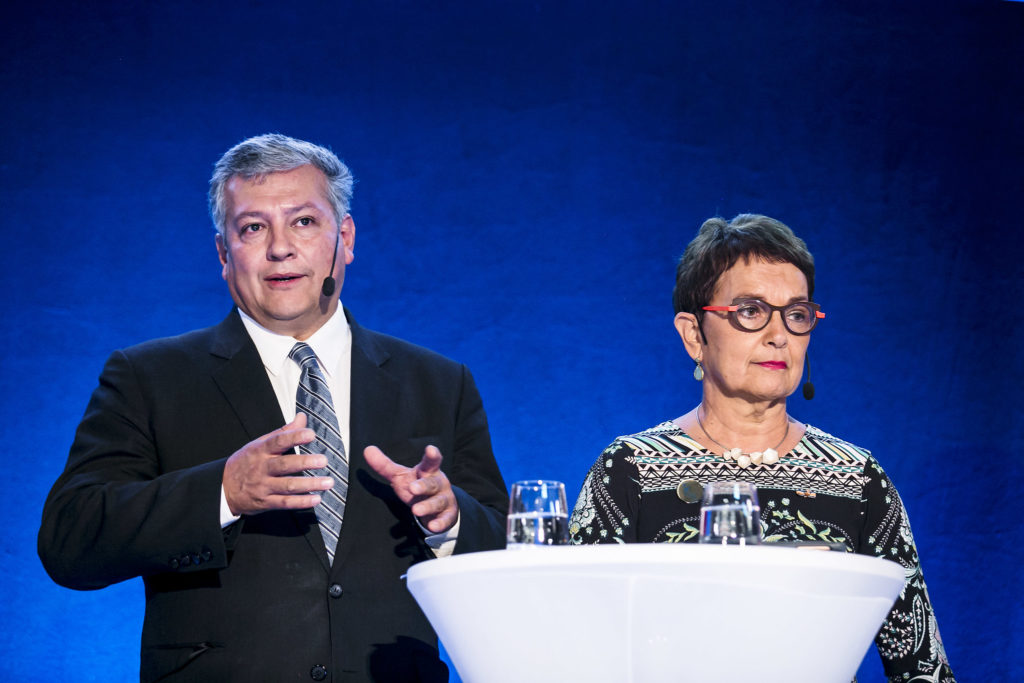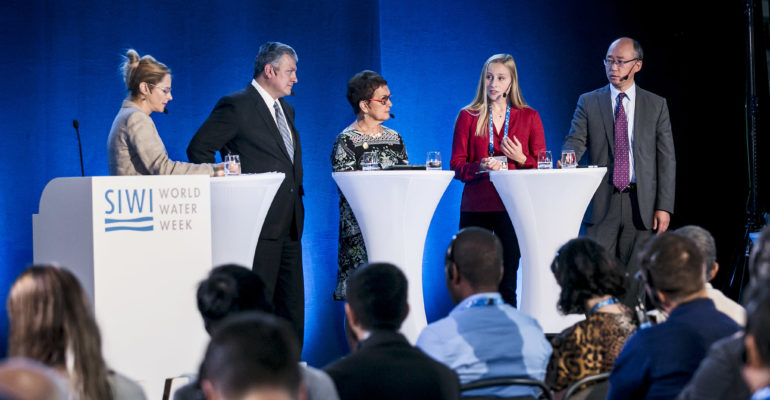World Water Week, Stockholm, 25-30 August 2019
A Summary report by Mary Muia SI UN Representative, Nairobi
PPP Water Infrastructure Master Class
“I was privileged to be a successful applicant to the Stockholm International Water Institute (SIWI) high level Master Class on Private Public Partnerships during the World Water Week 2019. The one-day course offered financial, procurement and engineering professionals a unique opportunity to learn more about leveraging alternative service delivery options for water infrastructure project development particularly in resource scarce regions like Africa.
The Master class was offered by the Africa-EU Water Partnership Programme’s expert team in partnership with the Nepad Business Foundation (NBF) to a limited number of registered World Water Week participants. The course aimed to expose executive project management teams within water utilities and other water infrastructure project sponsor bodies to the latest in water financial governance practices with a focus on Alternative Service Delivery (ASD) options. I was all smiles at the end of the course to warded with a certificate.
World Water Week Highlights:
 An SI Delegation included Assistant Director of Advocacy, Ulla Madsen, Soroptimist Amrita Gautama, and the SI President and President of Women for Water Partnership (WfWP), Mariet Verhoef-Cohen, who participated as a key note speaker, with Kusum Athukorala, Chair of NetWater, Sri Lanka and Sri Lanka Water Partnership.
An SI Delegation included Assistant Director of Advocacy, Ulla Madsen, Soroptimist Amrita Gautama, and the SI President and President of Women for Water Partnership (WfWP), Mariet Verhoef-Cohen, who participated as a key note speaker, with Kusum Athukorala, Chair of NetWater, Sri Lanka and Sri Lanka Water Partnership.
World Water Week in Stockholm, Sweden 25-30 August 2019, stands as the largest annual focal point for the globe’s water issues, and is organised by the Stockholm International Water Institute (SIWI). The forum attracted 4,000 participants from 138 countries, a third of which were under the age of 35, and their presence was highly noticeable throughout the conference. The 2019 theme emphasised ‘Water and society – including all’, recognising that not everybody in the world is facing challenges in the same way. With over 250 sessions held throughout the conference, the focus was on water as a solution to challenges, including climate change and food scarcity.
Within the theme of the forum ‘Water for All: Including All’, research was presented on the importance of integrating the perspectives of all ages, gender and social groups. Millions of lives could be at risk if serious action is not taken on the water crisis and global warming. Governments, institutions and companies were called upon to start applying water-based solutions that already exist, and to include everyone in the process. More conclusions and take home messages shared by key note speakers at the end of the forum can be accessed HERE and HERE.
Women and Youth: Living Apart Together:
I participated at the exciting forum on ‘Women and Youth: Living Apart Together’ sessions organised by Women for Water Partnership (WfWP) in collaboration with Soroptimist International. Women and youth face different challenges on their fight for equality within the water sector. Gender and age-related disparities in a male dominated sector are some realities to be eliminated to ensure Water for all and inclusion of vulnerable groups such as women and youth.
Empowerment processes need to be established to ensure that stakeholders participate equally and that their voices are being heard. There is need to better understand gender and youth patterns and shift policy and practice in the water sector. The SI global network of members is well placed to engage its members to continue raising women and youth voices in the water sector. This can be through the creating of safe spaces for women and youth to enhance meaningful participation. Whilst women represent more than 50% of the world population, less than 1% of development aid is designated to women and their organisations directly. To achieve equality in water and sanitation, there is need for an equal share in funding.

Photo: World water week 2019, Closing Session by Mikael Ullén
In addition, the voices and meaningful participation of women and youth bring equality to the water sector and investing in youth and women is key to supporting change. Therefore, water programmes must be designed and implemented so that no one is left behind. In her remarks at the closing ceremony, President Mariet emphasised that “water resources are not equally shared and can be a source of conflict resulting into gender-based violence against women. Hence, water access can be used to bring empowerment and equality to women and youth”.
Women, Water and Climate Crisis:
With a focus on water and climate change, discussions surrounded the link between climate change and water, and that meeting the climate challenge means:
- Acting Now;
- Considering water as part of the solution;
- Improving water management practices;
- Ensuring transboundary cooperation in adaption;
- Rethinking financing.
Youth Mentorship initiatives where student and young people are paired with professionals as they enter the water sector, will cultivate the next generation of water leaders. Young people are NOW, not the FUTURE said a young female panelist at the closing ceremony. More information HERE.
Women, Water and, Sanitation:
I was able to attend a session on water governance, finance and self-reliance for sustainable water, sanitation and hygiene (WASH) service delivery, convened by the USAID WASH FIN Program in Kenya. Focusing on how partnerships across sectors will leverage scarce public funds to crowd-in-private funding, discussions covered the importance of fostering good governance for financing, and how stakeholders will be best placed to effectively mobilise the finances required for all sources. More information HERE.

Photo: With Doreen Mbalo Programme Manager GIZ Bonn, Barbara Kazimbwe Director WASH FIN USAID at the launch of the Water and sanitation network in Africa.
Programmes need to adopt an approach to strengthen water governance and enhance the enabling environment as a foundation to mobilise resources of finance from donors, and transition away from donor dependent WASH systems, to self-reliance. More information HERE.
LEAD IMAGE: Key Reflections at the Closing Plenary Photo by Mikael Ullén


Thank You Mary for your blog on this important topic. You represented us very well at this event.